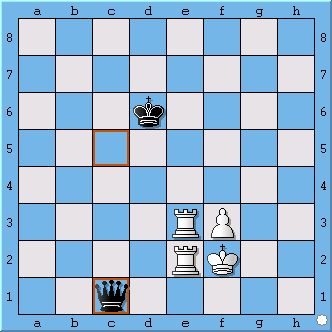I think you and bwight might be mistaking what is being referred to by dominant strategy. This link might clear that up.
http://levine.sscnet...eral/cogsci.htm
Dominant strategy equilibrium – strategy profile in which each player plays best-response that does not depend on the strategies of other players
I'm going to unfortunately disagree with Bwight and say that my definition of dominant strategy did match the above, and I still think that chess (probably) has dominant strategy.
Dominant strategy as I understand the above means "what move you make so that no matter what your opponent does you are in a better position to win" or perfectly, en-route to a guaranteed win (or at least a guaranteed non-loss, for example in the case of Tic-tac-toe).
This is not the same moving to put you in a better position than you are currently. Nor is it the same as moving to put you in a better position than your opponent. This'd depend on how you define 'better position' though.
Imagine the following scenario:
Two players want to kill a mob/boss. The boss is a pansy and does no damage, but he has a large amount of health so he takes a while to kill. Once he reaches 80% health he will randomly kill either 'Everyone within 10 feet' or 'Everyone more than 10 feet away.' There is a time limit to DPS him down to 0.
Now, the "Dominant Strategy" is for one person to be within 10 feet, and the other to be more than 10 feet away. Once he reaches 80%, one player is going to die, and the other player is free to DPS him down to 0.
However, if you consider that if you had both stood within 10 feet, and he killed everyone more than 10 feet away, you would be in a better position than the above, since neither of you die.
The dominant strategy isn't oriented towards "the best possible position" but towards "the best possible position considering every situation" or even "in the worst case scenario"
Talking about chess specifically, in the end-game dominant strategies become clearly apparent. In the following example:
(Image and quotes from:
http://rjlipton.wordpress.com/2010/05/12/can-we-solve-chess-one-day/ )

Here White can give checkmate—in 99 moves. I don’t think a human would even find the first move, let alone all 99.[/quote]
Computers have currently 'solved' perfect play for 5 pieces on the board. 3 pieces plus the 2 kings.
...if you got down to 5 pieces, you might as well be “playing chess against God”[/quote]
Actually up to six pieces, and currently working on seven; the problem is getting to the point where we know every possible move right from the beginning of the game.
Now, none of this proves that there is a dominant strategy for the game of chess. But, if you got a chess board and placed the two kings and any three other pieces, there is definitely a dominant strategy for one of the players. The fact is that, from the start of the game, the teams are perfectly balanced, but one player moves first, and the other responds. This lends itself to a slight bias toward one player or the other, and makes it more probable for a dominant strategy to exist for one or both players.
We'll know in a few years once the computers have figured it out.









